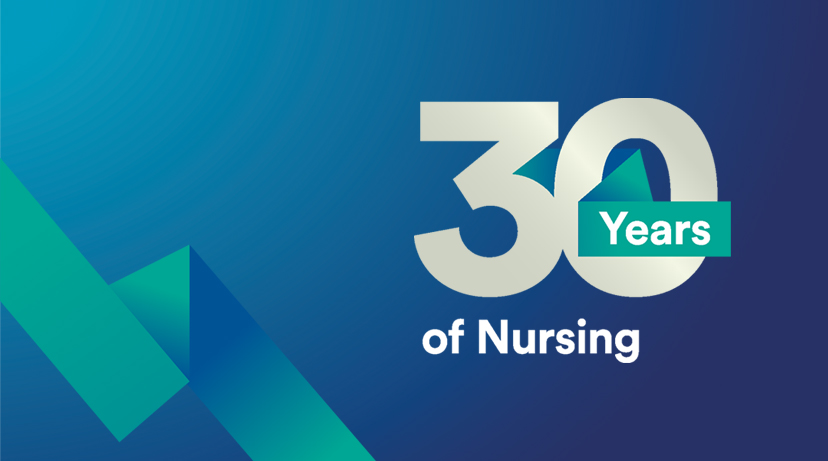
October 7, 2020, by sleatherland
30 at 30: Dean’s Blog
We’ve launched our 30 years of nursing celebrations! Our first blog post from Professor Joanne Lymn (Dean and Head of the School of Health Sciences).
2020 is a really important year for nursing. For the School of Health Sciences we are celebrating 30 years of nursing at Nottingham. Globally however 2020 was designated the international year of the nurse and midwife by the World Health Organisation, and 2020 marks 200 years since the birth of Florence Nightingale, often referred to as the founder of modern nursing. It has not been the year of celebrations that we were planning but 2020 has certainly demonstrated the value and importance of nursing as a highly skilled profession.
One of the most important considerations in nursing education is the partnership working with our local healthcare providers. Placement experience comprises 50% of the nursing course and the care excellence experienced by our students in the placement setting enhances their learning. Our healthcare partners are pivotal to our success and I would like to thank them all for their continued support particularly as we continue to navigate the challenges that 2020 has brought with it.
Stepping back from these uncertain times to think about the origins of modern nursing education, these can probably be traced back to 1860 and the opening of the Florence Nightingale School for Nurses in London, which makes modern nursing education about 160 years old. It wasn’t until 1919 however that nursing became a registered profession and interestingly Nurse Number 1 on the register was Ethel Bedford Fenwick who actually did her training at the Children’s hospital here in Nottingham.
Despite the age of formal nursing education and the suggestion from the Briggs Committee in 1972 that nurses should be prepared through degree level study it wasn’t until 2009 that Nursing became an all-degree profession. This makes nursing education an interesting contrast of both very old and very young! Despite not being an all degree profession prior to 2009, nurses have taken on a range of advanced skills, for example they were awarded independent prescribing rights in 2002. Whilst this was initially for a limited formulary these rights have expanded and appropriately qualified nurses now have similar prescribing rights to doctors.
Nursing at Nottingham University was established 30 years ago and five years later merged with Mid-Trent College making the University one of the largest providers of nursing education in the region. In those early days nursing education was delivered not just in Nottingham but also at a number of outlying education centres such as Boston, Derby, Lincoln, Grantham and Mansfield educating nurses at diploma and degree level.
Over the last 10 years the School of Nursing has become the School of Health Sciences and has centralised its education such that we are now only delivering nursing education in Nottingham. In its various incarnations the School has qualified in excess of 12,000 nurses many of whom have stayed in the region to work, contributing to the excellence in nursing care locally. Currently the School graduates around 400 nurses each year at both BSc and MSc (graduate entry nursing) level.
As a School we strive for excellence in nursing education aiming to educate and nurture the best and brightest student who will go on to transform the lives of individuals and communities locally, nationally and internationally. Our success in this area is evidenced by national recognition of our students, individually and as teams, through eleven student nursing times awards in the period 2014-2019. These awards have included Student Nurse of the Year: Adult (2014), Student Nurse of the Year: learning Disabilities (2015, 2016, 2017 and 2018), Student Nurse of the Year: Child (2019), and team awards such as Teaching Innovation of the Year (2014, 2017) and most recently the Mary Seacole Award for Outstanding Contribution to Diversity and Inclusion.
The School does not just deliver pre-registration nursing education it also delivers a range of post-registration courses including Advanced Clinical Practice, Advanced Nursing and Non-Medical Prescribing qualifications and runs a PhD programme. In this way the School supports registered nurses to develop additional advanced skills both clinically and academically. Our post-registration students and their educational experience have also been recognised by a number of student nursing times awards.
As a Russell Group University Nottingham is not just striving for excellence in nursing education but also for excellence in nursing research. Indeed in the last research excellence framework 100% of our environment and impact were considered to be world leading or internationally excellent. An important area for us currently to support research excellence is the development of clinical academic careers for nurses, midwives and allied health professional staff.
Over the four years that I have had the privilege to lead the School of Health Sciences I have seen nursing develop as a profession with an increasing diversity of opportunities available to qualified nurses clinically, in education and in research. I hope that we will be able to explore some of these diverse career paths in additional blogs within this series.
Thank you to everybody who has contributed to 30 years of nursing excellence at Nottingham. This is not only a celebration of our achievements but also a platform for all the achievements to come.
No comments yet, fill out a comment to be the first

Leave a Reply